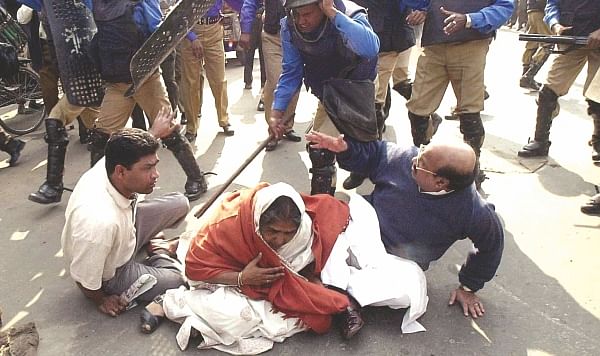| Home - Back Issues - The Team - Contact Us |
 |
| Volume 10 |Issue 36 | September 23, 2011 | |
|
|
Letters Dubious Role of Police A handsome thanks goes to The Star magazine for a timely cover story in its September 9 issue, considering the present situation of our country. In all the countries of the world, the police force is established to ensure protection and security to its citizens but in our country the situation is very different. We are so ill-fated that we have to struggle to keep ourselves protected from the greedy grasp of the police! Instead of providing us with sincere, and faultless security, sometimes our police force acts blindly on behalf of the government for the suppression of the opposition, sometimes on behalf of business magnets, and even at times to fill in their own pockets. Every year we come across some new and horrifying incidents committed by our police force. It seems there is no end to this. This year we have seen how our government used police to repress the political movements of opposition alliances. In fact this picture is same under all the governments. The situation has becomes so nasty that even the meritorious students of our country have to give up their lives, and sometimes lose limbs, becoming poor victims in the hands of notorious police. Perhaps this is turning into a sort of game for the police force. And, we have become immune to this type of misrule. In such a terrible situation, I will not hope for any immediate action from our government, as along with other citizens of our country, I do know very well that the government will not do anything for its poor, helpless citizens. Perhaps, we have no one to whom we can seek justice. Maybe, we have to endure all sorts of police oppressions under their nicely-fitted mask of 'protection'. Moontaha Munira
Reforming the Police Administration in Bangladesh It is currently observed that some sections of the police force are involved in various anti-social activities. The issue is now clear after a series of heinous events like the Amin Bazar incident and Dhaka University student Kader's injury. We, however, know that the prime duty of the police as a state institution is to protect the valuable lives, liberties and properties of the common people. But some members of police are unfortunately diverted from that principal goal. For this deviant behaviour several factors may be accounted. Firstly, the confrontational character of our national politics obviously makes the whole administration vulnerable. This, in turn, weakens the chain of command, as the police act in an environment of instability and pressure. They remain worried constantly for favourable transfer, job security and promotion. Secondly, the police are not given a space to work independently. They are often directed in crushing the opposition. Thirdly, the degradation of our social values encourages corruption in the police department. Also, a large number of the police force recruited on the basis of political party considerations would not usually be competent enough to serve the nation. Instead, they try to appease the party bosses for everything. They are opportunist in nature. Reforming the police administration is of great importance. Police is now regulated by the Act passed by the then oppressive colonial regime. So the police Act, for example, must be modernised. It is also important to monitor the day-to-day activities of the members of the organisation. We can think of new effective institutional mechanism in this regard. This kind of structural reforms will be helpful to check the unexpected behavior of the police. Another such area of reform is training. In fact, a continuous process of training might make the police officers morally sound. Saleh Md Shahriar The Kidney Crisis As I heard my family retelling the incident of the kidney-selling crisis to me, I was imbued with myriad emotions: horror, shock, apathy and utter disgust. What perturbed me above all was that these heartless mercenaries who committed the crime of robbing innocent civilians of their organs were educated people.
Has our society completely lost all humanity to care for the very patients they had sworn to serve? Have we been breeding monsters who utilise their invincible power of the letter to harm their fellow beings in unspeakable ways for money? Is that what our education system is injecting this very moment into the malleable minds of our children? Is money really more valuable than the lives of human beings? Apparently, and regretfully, the answer to all these questions was a terrifying yes. We have stealthily surpassed the farthest realms of savagery. And we continue to do so with pride. What do the lives of a few hundred people matter if their loss can gain so much wealth and fortune to the, barbarious few? We need to wake up! Things have to change. But to bring this change about, we need to nip the problem in the bud. We need to teach our future doctors, engineers, teachers, leaders, etcetera that money is not the final aim. We need to end the mercenary ideals we have so deeply ingrained into our minds. Unless we realise that it is costing us something priceless--our humaneness--we will continue to raise our sons and daughters to become mindlessly cruel and greedy. Sarah Iqbal Submission Guideline: Letters to the Editor, Star Diary and Write to Mita, with the writer's name and address, should be within 200 words. All articles should be within 1,200 words. A cover letter is not necessary, but every write-up should include the writer's name, phone number and email address (if any). While The Star welcomes unsolicited articles and photographs, it cannot accept the responsibility of their loss or damage. The Star does not return unsolicited articles and photos. Response time for unsolicited write-ups ranges from three weeks to two months. All articles submitted are subject to editing for reasons of space and clarity. Copyright
(R) thedailystar.net 2011 |

